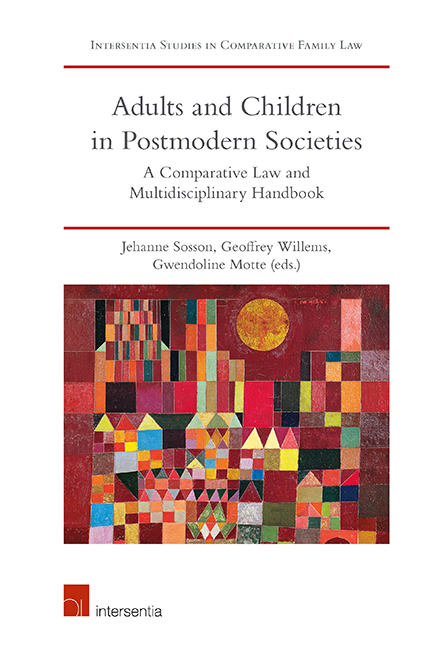Book contents
- Frontmatter
- Contents
- List of Cases
- List of Contributors
- Introduction
- PART I NATIONAL REPORTS ON LEGAL REGULATIONS OF RELATIONSHIPS BETWEEN ADULTS AND CHILDREN
- Questionnaire
- Models
- Algeria
- Argentina
- Australia
- Belgium
- Canada
- Democratic Republic of the Congo
- England and Wales
- France
- Germany
- Ireland
- Italy
- Japan
- The Netherlands
- Romania
- Spain and Catalonia
- Sweden
- Switzerland
- United States of America
- PART II INTERDISCIPLINARY APPROACH
- PART III INTERNATIONAL LAW INSIGHTS
- PART IV COMPARATIVE APPROACH
- General Conclusion: The Challenge of Transparent and Inclusive Parenthood/Parentality in a Pluralist and Cosmopolitan Context
- About the Editors
Belgium
from PART I - NATIONAL REPORTS ON LEGAL REGULATIONS OF RELATIONSHIPS BETWEEN ADULTS AND CHILDREN
Published online by Cambridge University Press: 26 June 2019
- Frontmatter
- Contents
- List of Cases
- List of Contributors
- Introduction
- PART I NATIONAL REPORTS ON LEGAL REGULATIONS OF RELATIONSHIPS BETWEEN ADULTS AND CHILDREN
- Questionnaire
- Models
- Algeria
- Argentina
- Australia
- Belgium
- Canada
- Democratic Republic of the Congo
- England and Wales
- France
- Germany
- Ireland
- Italy
- Japan
- The Netherlands
- Romania
- Spain and Catalonia
- Sweden
- Switzerland
- United States of America
- PART II INTERDISCIPLINARY APPROACH
- PART III INTERNATIONAL LAW INSIGHTS
- PART IV COMPARATIVE APPROACH
- General Conclusion: The Challenge of Transparent and Inclusive Parenthood/Parentality in a Pluralist and Cosmopolitan Context
- About the Editors
Summary
CHANGES IN THE TRADITIONAL FAMILY
A. MOTHERS
1. Is maternity automatically established by the birth certificate?
In Belgian law, maternity is established in three different ways that are hierarchically ordered. According to the Act of 31 March 1987, maternity is first of all, and almost always, established by the birth certificate (art. 312, § Belgian Civil Code, hereafter: BCC). The woman whose name is mandatorily mentioned on the birth certificate is assumed to have given birth to the child, and therefore is legally considered to be the child's mother (art. 57, 2 ° 1 and 312, § 1 BCC).
Secondly, in cases when the mother's name is not mentioned on the birth certificate and/or when the birth certificate is lost, a woman can still establish her maternity on the grounds of legal recognition of the child (art. 313, § 1 BCC).
Thirdly, if there is still no maternity established, it can be established by a judicial decision which states that the woman gave birth to the child in question (art. 314(1) BCC) (for the procedure see Q. 6).
2. Does your jurisdiction recognise any kind of ‘anonymous childbirth’?
Anonymous childbirth is prohibited in Belgium as a consequence of the mandatory mentioning of the mother's name on the birth certificate (see Q. 1).
3. If any kind of ‘anonymous childbirth’ is recognised, what rights does the natural mother have in respect of the child?
We consider this question outside the scope of the Act on medically assisted reproduction and the disposition of supernumerary embryos and gametes of 6 July 2007 (MAP Act) (see Q. 13 and further). In exceptional situations where the name of the mother is not on the birth certificate (foundlings), the biological mother can recognise the child or start a judicial procedure (see Q. 1). She can also exercise a right of personal contact (art. 375 bis BCC). In cases when an agreement cannot be reached with the persons who take care of the child, the natural mother can submit a request to the family court.
- Type
- Chapter
- Information
- Adults and Children in Postmodern SocietiesA Comparative Law and Multidisciplinary Handbook, pp. 111 - 148Publisher: IntersentiaPrint publication year: 2019

